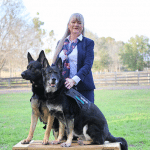Blake Sowers, Kennel Master at Guardian Angels Medical Service Dogs and US Army Veteran, joined the Guardian Angels team in July 2022. (more…)
Regis, a 100% medically retired Navy veteran, served for approximately 16 years. He has been married to his wife for almost 21 years and together they have five children. His oldest child joined the Navy when she graduated in 2016. Regis said he enjoys spending time with his wife and children, as well as his service dog Cheyenne, who he was paired with in 2016. (more…)
Service dogs can provide a wide range of support for people with PTSD. This condition impacts portions of the brain that regulate emotions and fear responses. It is characterized by high anxiety, panic attacks, brittle emotions, debilitating triggers, and re-experiencing traumatic events through flashbacks and/or night terrors. It is common in veterans and first responders but can be experienced by anyone who has suffered through a traumatic event or series of traumatic events. Symptoms of PTSD frequently lead to isolation and serious depression. (more…)
Playtime is especially important for dogs, just as it is for humans because it is a time of bonding, enrichment, relaxation, and there is no pressure. We have certain games that are good games and others that are not appropriate for service dogs.
Playtime Activities to Never Do with Your Service Dog
We never play tug of war with our service dogs. Instead, we always teach them to drop an item in our hand. Playing tug of war would be very counterproductive. We also don’t wrestle with the dog; some people like to get rough, wrestle, roll, and tumble which is also opposite of their training and inappropriate for many reasons.
We never want them to have that kind of contact with a disabled individual or jump on them at an inappropriate time because in a dog’s mind, if it’s okay sometimes, it should be okay all the time. We must be consistent in our behaviors and actions around our dogs.
Safe Exercises for Your Service Dog
A game enjoyed by many dogs is chasing a ball. When playing fetch, you want to make sure they bring it back to hand. When you play ball with your dog, never throw it up in the air. While they are tremendous athletes, and they love to play, they can suffer damage just like a football, basketball, or a pole vault player. When they jump up in the air and down again, they put high impact on their joints. They can tear a ligament or muscle just like an athlete.
Even if you don’t see an injury earlier in life, these are things that could cause complications later in the service dog’s geriatric life. So, throw the ball out straight, not up in the air. This way the dog can chase out directly for it instead reducing the chance of injury.
If your service dog doesn’t bring the ball back, then there are other lessons that need to go into the rules of that game. It’s just like playing any other kind of game. For example, if you’re playing Monopoly, there are certain rules. You roll the dice, there are so many spaces you can go to when you can collect, not collect, etc. So, just like there are rules to that type of a game, what you need to do is teach your dog the rules of our games.
For service dogs, we start very young because we turn these games into tasks later in life. Therefore, they enjoy their tasks. They think their tasks are a lot of fun because these are the games, we played to set their foundation.
If your dog doesn’t enjoy playing ball, then go for walks or practice their obedience training. Even though they might be stellar at doing all their basic obedience this is a wonderful time for bonding and great positive reinforcement with treats. Practice their sit, stay, down, recall and heeling while making sure it’s all a positive experience.
Every time they do something right, reward them right away. Dog’s think within the moment, so you need to capture behaviors by being quick with the reward.
If you want to get creative, you could set up little obstacle courses in your backyard, with different things for them to learn to do, like wobble tables and teeter-totters. You can also set up hay bales at different heights or set up tires for jumping through. There are a lot of different ways you can be creative. Just be sure that you don’t make anything dangerous. You would never want exercises that would risk their health or well-being by causing an injury.
Pay Attention to the Weather When Playing Outside with Your Service Dog
Recipients and dog owners need to be very cognizant of the temperature outside. Many dogs are very high energy with a lot of drive. They will continue to play ball until they drop over with a heat stroke. Dogs get hot much quicker than people; it’s harder for them to cool themselves. If it’s hot out, you need to play early in the day or late in the day and limit the activities. Even if the dog still wants to play, you might need to stop sooner for the dog’s well-being.
The same thing goes if it’s cold or freezing outside. You want to make sure their feet are protected since dogs can get frostbite just like people. Always be aware. Never walk them on hot pavement or blacktop. We’ve seen dogs with horrible burns on the bottom of their feet, and they can’t walk for days.
Also, if your dog is normally on grass and you’re going someplace to throw the ball, like a parking lot or a tennis court, it’s important to keep in mind that it can take all the protective layers off the pads of their feet. With this type of injury, they will be lame for days, and they will have bloody sores on the pads of their feet, which causes them serious pain to walk. Always be sure their feet are protected in these situations.
Have Additional Questions About Playtime for Your Service Dog? Contact us Today at MedicalServiceDogs.org!
Many people do not realize the difference between visible and invisible disabilities. As human beings, we are visual creatures. When we see someone walking with a cane, in a wheelchair, or with braces on their legs, we immediately realize that this person has a disability, and we can put that in terms that our mind understands. What we don’t see is the cashier ringing up your groceries who may have a very serious diabetic imbalance – a brittle diabetic that could suddenly collapse or become incoherent because you don’t see diabetes externally until something happens. (more…)
Jonathan Conover, MSW, LCSWA, is an Army Veteran who served for eleven years, with one deployment to Iraq and three to Afghanistan. He is now a Licensed Clinical Social Worker employed as an independently contracted outpatient therapist. (more…)
In honor of Administrative Professionals Week last week, Guardian Angels would like to feature Gwyneth Hiesinger, who works in the organization’s finance department. She assists the organization with a variety of tasks, such as tracking donations and the money that goes out of the organization. Gwyneth recently celebrated her one-year anniversary with Guardian Angels Medical Service Dogs in February. (more…)





